Thomas Gold Appleton
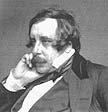
Trustee of the Library, 1852-1856. Born 1812 to a Boston merchant and manufacturer; died 1884 while on a trip to New York. An essayist, amateur artist and poet, as well as a collector and patron of the arts, Thomas Appleton was a celebrated citizen of Boston. After graduating from Harvard University in 1831, Thomas Appleton pursued his interests in art and literature, living in Europe for a time. Even before his return to Boston, he became a trustee of the Boston Public Library as part of a contemporary movement to make art and learning available to everyone. Also a trustee for the Boston Museum of Fine Arts, he made many contributions of money and artwork to both institutions; the Library’s print collection originated from the generous donation of his Tosti collection of engravings in 1869. After his death, a bust in his image was donated by family members to the Library in 1885 and can now be seen in Bates Reading Hall today.
Sources:
Hughes, Lynn Gordon. “Thomas Appleton”, Dictionary of Unitarian & Universalist Biography [online database] at http://www.uua.org/uuhs/duub/articles/thomasappleton.html.
Wadlin, Horace G. The Public Library of the City of Boston: A History. Boston: Trustees of the Boston Public Library, 1911.
Illustration:
“Thomas G. Appleton”, salt print, 1850’s, from Portrait Collection, Print Dept.
John Prescott Bigelow

Trustee of the Boston Public Library, 1852-1868. Born 1797 in Groton, MA; died 1872 in his Boston residence. A veteran Massachusetts politician by the time he served as Boston’s mayor from 1849-1851, John P. Bigelow witnessed and participated in the formation and development of the Public Library. Through his support, City and private funding as well as material donations were encouraged during his mayoral term. Upon leaving public life, he was elected to the Board of Trustees as one of its first citizen members. The first fund received by the Library for acquiring books was the Bigelow Fund, which was established through his contribution to the fledgling Library of monies raised for a testimonial to recognize his efforts during an 1849 cholera outbreak in Boston.
Sources:
Green, Samuel A. Groton Historical Series, vol. 3. Cambridge, MA: University Press, J. Wilson and Son, 1887-1899, p. 254.
Kestenbaum, Lawrence. “Index of Politicians: Bigelow”, The Politicial Graveyard: A Database of Historic Cemeteries [online database] at http://politicalgraveyard.com/bio/bigelow.html .
Wadlin, Horace G. The Public Library of the City of Boston: A History. Boston: Trustees of the Boston Public Library, 1911.
Illustration: "John P. Bigelow", engraving, from Massachusetts Political Archive, Print Department
Edward Everett
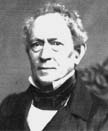
Trustee of the Boston Public Library, 1852-1865. President of the Board of Trustees, 1852-1864. Born 1794 in Dorchester, MA; died 1865 in Boston. Clergyman, politician, author and orator. A veteran politician and statesman by the time of his election to the Board of Trustees, Edward Everett was designated its first President. He graduated from Harvard University in 1811 and served as a faculty member, later its President, and for several periods one of its Overseers. His public life included service in both houses of Congress representing Massachusetts, as Secretary of State to Millard Fillmore, as Governor of Massachusetts, and speaking extensively in support of the Union cause—his most famous speech was delivered before the President’s Address at Gettysburg, PA. A firm believer in libraries as part of a complete education for all people, the gift of his personal collection of public and State documents to the City Library began Edward Everett’s constant support in guiding the development of the Library until his death in 1865. His bust, created by Thomas Ball, stands in Bates Reading Hall today.
Sources:
“Edward Everett”, Encyclopedia of World Biography, 2nd ed. 17 Vols. Gale Research, 1998. Reproduced in Biography Resource Center. [Online database] Farmington Hills, MI: The Gale Group, 2003. at http://www.galenet.com/servlet/BioRC via BPL Electronic Resources web page.
Wadlin, Horace G. The Public Library of the City of Boston: A History. Boston: Trustees of the Boston Public Library, 1911.
Whitehill, Walter Muir. Boston Public Library: A Centennial History. Cambridge, MA: Harvard University Press, 1956.
Illustration:
“Edward Everett”, salt print, 1850’s, from Portrait Collection, Print Dept.
Nathaniel Bradstreet Shurtleff
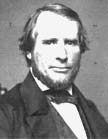
Physician, antiquary, genealogist, politician and author. A graduate of Harvard University in 1831 and of its medical school in 1834, Nathaniel Shurtleff was passionate about Massachusetts history which led to his thorough editing and publishing of several collections of early Massachusetts records, as well as tracing his family to eleven of the Mayflower Pilgrims. Following his terms as Boston’s mayor between 1868 and 1870, he published, A Topographical and Historical Description of Boston, his most important work, in 1871. Nathaniel Shurtleff created for the Library the book numbering system that denoted the exact alcove, range and shelf location of each book, and co-developed the rules and regulations for public use of the Reading Room at the original Mason Street site of the Library.
Sources:
“Nathaniel Bradstreet Shurtleff”, Dictionary of American Biography Base Set. American Council of Learned Societies, 1928-1936. Reproduced in Biography Resource Center. [Online database] Farmington Hills, MI: The Gale Group, 2003. at http://www.galenet.com/servlet/BioRC via BPL Electronic Resources web page.
“Nathaniel Bradstreet Shurtleff”, Virtual Americans Biographies [online database] at http://famousamericans.net/nathanielbradstreetshurtleff/
Wadlin, Horace G. The Public Library of the City of Boston: A History. Boston: Trustees of the Boston Public Library, 1911.
Whitehill, Walter Muir. Boston Public Library: A Centennial History. Cambridge, MA: Harvard University Press, 1956
Illustration:
"Mayor Nathaniel B. Shurtleff", salt print, 1850's, from Massachusetts Political Archive, Print Dept.
George Ticknor
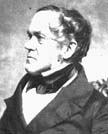
Founder and Trustee of the Boston Public Library, 1852-1866. President of the Board of Trustees, 1865. Born 1790 and died 1871 in Boston. Scholar, educator and author. A graduate of Dartmouth College in 1807 at age 16, George Ticknor would become Harvard University's first professor of Modern Languages and Literature, and was the author of History of Spanish Literature, among other histories and biographies. Like Everett, he believed in libraries as an important educational component for the populace and insisted that Boston's library be developed to freely circulate its book collection. Ticknor's detailed contributions on the original library proposal to the City Council set the standard for the public library movement. After his death, his collection of books on the Spanish peninsula was bequeathed to the Library with the stipulation that none should ever leave the library building. In 1895, a portrait of George Ticknor by Thomas Sully was donated to the Library by his daughter Anna and now hangs in the Rare Books Reading Room.
Sources: "George Ticknor", Encyclopedia of World Biography, 2nd ed. 17 Vols. Gale Research, 1998. Reproduced in Biography Resource Center. [Online database] Farmington Hills, MI: The Gale Group, 2003 at http://www.galenet.com/servlet/BioRC via BPL Electronic Resources web page.
Wadlin, Horace G. The Public Library of the City of Boston: A History. Boston: Trustees of the Boston Public Library, 1911.
Whitehill, Walter Muir. Boston Public Library: A Centennial History. Cambridge, MA: Harvard University Press, 1956.
Illustration: "George Ticknor", salt print, 1850's, from Print Dept.
William Whitwell Greenough
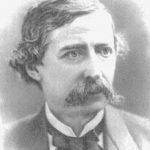
Trustee of the Boston Public Library, 1856-1888. President of the Board of Trustees, 1866-1888. Boston merchant and politician. Born 1818 and died 1899 in Boston. William Greenough pursued the mercantile life after graduating Harvard University in 1837, and served on the Boston City Council from 1847 to 1849. A trustee with Ticknor and Everett, he served 32 years on the Board and in an unpaid administrative capacity selecting and purchasing books from Europe. President Greenough urged the construction of a new library building and appointed the firm of McKim, Mead and White to design the building in Copley Square. For reasons of health and private affairs, he resigned from the Board in 1888, but his interest in the Library continued until his death in 1899. A bust of William Greenough given by his widow stands in Bates Reading Hall.
Sources:
Wadlin, Horace G. The Public Library of the City of Boston: A History. Boston: Trustees of the Boston Public Library, 1911.
Whitehill, Walter Muir. Boston Public Library: A Centennial History. Cambridge, MA: Harvard University Press, 1956.
Illustration:
“William W. Greenough”, salt print, Print Department
Henry Ingersoll Bowditch
Trustee of the Boston Public Library, 1865-1867. Born 1808 in Salem, MA; died 1892. Physician, author and abolitionist. A son of mathematician Nathaniel Bowditch, Henry I. Bowditch graduated from Harvard College in 1828 and completed his medical training there in 1832, spending an additional 2 years studying with physicians in Paris, France. While in Europe he was so impressed with the anti-slavery writings of William Wilberforce that he became a militant abolitionist on his return to Boston. His medical contributions to public health service include establishing a board of health for Massachusetts and publishing Public Hygiene in America, as well as detailed studies on tuberculosis, one of the chest diseases in which he specialized. Prior to the 1858 opening of the Library’s Boylston Street building, Henry I. Bowditch and his brothers donated their late father’s collection of some 2,500 mathematic, navigation and astronomy books, with the stipulation that they be kept together and not circulate so as to provide reference to those who would have need of their contents.
Sources:
“Henry Ingersoll Bowditch”, Encyclopedia of World Biography, 2nd ed. 17 Vols. Gale Research, 1998. Reproduced in Biography Resource Center. [Online database] Farmington Hills, MI: The Gale Group, 2003 at http://www.galenet.com/servlet/BioRC via BPL Electronic Resources web page.
Wadlin, Horace G. The Public Library of the City of Boston: A History. Boston: Trustees of the Boston Public Library, 1911.
Whitehill, Walter Muir. Boston Public Library: A Centennial History. Cambridge, MA: Harvard University Press, 1956.
Dr. Winslow Lewis
Trustee of the Boston Public Library, 1867. Born 1799 to sailor and lighthouse builder, Winslow Lewis; died 1875 in Grantville, MA. Physician, surgeon and politician. A descendant of Plymouth Colony's Winslow family, Winslow Lewis graduated from Harvard College in 1819 and completed his medical training there in 1822. He immediately went to Europe to advance his medical training and would later return often for pleasure. His skills as a surgeon were augmented by his interests in anatomy and led to his editing and translating some medical texts from French. Besides private practice, Dr. Lewis' medical career included service as Consulting Physician for Massachusetts General Hospital, as well as Physician to the House of Corrections and the Municipal Institutions. He would also serve several terms in the Massachusetts State Legislature. Before joining the Library's Board of Trustees, Dr. Lewis was president of the New England Historic Genealogical Society from 1861 to 1866.
Sources:
Sheppard, John H., Esq. "A Brief Memoir of Dr. Winslow Lewis", New England Historic Genealogical Society Register, v.17, January 1863, pp. 1-13.
"Winslow Lewis (1770-1850)", Encyclopedia of World Biography, 2nd ed. 17 Vols. Gale Research, 1998. Reproduced in Biography Resource Center. [Online database] Farmington Hills, MI: The Gale Group, 2003 at http://www.galenet.com/servlet/BioRC via BPL Electronic Resources web page.
Wadlin, Horace G. The Public Library of the City of Boston: A History. Boston: Trustees of the Boston Public Library, 1911.
Whitehill, Walter Muir. Boston Public Library: A Centennial History. Cambridge, MA: Harvard University Press, 1956.
Justin Winsor
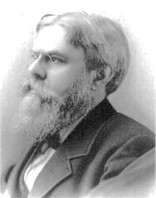
Trustee of the Boston Public Library, 1867-1868. Superintendent of the BPL, 1868-1877. Historian, author and librarian. Born 1831 in Boston and died 1897 in Cambridge. A graduate of Boston Latin School, Justin Winsor went on to attend Harvard University. During his freshman year, he compiled and published his first book, A History of the Town of Duxbury. Although he did not graduate with his class, he would eventually receive his degree with the class of 1853 and write various articles and poetry for periodicals until his appointment to the Board of Trustees in 1866. On the death of the superintendent and during the illness of the assistant superintendent, Justin Winsor was asked to take charge of the Library in 1868. He proved to be a capable manager and became the permanent superintendent, serving nine years. During his tenure, Justin Winsor advocated and developed a branch library system to get more books into the Boston communities and thereby encourage people to read. Misguided municipal politics led to his resignation from Boston and to a new position as Librarian of Harvard University in 1877. A pioneering librarian in the young American library community, Justin Winsor helped found the American Library Association and served a number of terms as its President, as well as continuing to be a prolific writer, publishing numerous articles and notes, and a number of books on American history up to his death at age sixty-six.
Sources:
“Justin Winsor”, Dictionary of American Biography Base Set. American Council of Learned Societies, 1928-1936. Reproduced in Biography Resource Center. [Online database] Farmington Hills, MI: The Gale Group, 2003 at http://www.galenet.com/servlet/BioRC via BPL Electronic Resources web page.
Wadlin, Horace G. The Public Library of the City of Boston: A History. Boston: Trustees of the Boston Public Library, 1911.
Whitehill, Walter Muir. Boston Public Library: A Centennial History. Cambridge, MA: Harvard University Press, 1956.
Illustration:
“Justin Winsor”, photograph by A.W. Elson & Co., appearing in The Public Library of the City of Boston: A History, between pp.76-77.
Samuel A. Green
Trustee of the Boston Public Library, 1868-1878. Born 1830 in Groton, MA; died 1918. Physician, librarian, politician, author and antiquarian. A graduate of Harvard College in 1851, Samuel Green received his medical degree from Harvard Medical School in 1854 and continued his medical studies in Philadelphia and Europe. The first physician in the state to enter the army medical service, he served in two Massachusetts regiments and in a number of other medical staff positions during the Civil War. Upon his return to Boston, Dr. Green continued his medical practice and found time to also serve as the city physician and mayor of Boston for one term. He assumed the temporary position of “Trustee in Charge” following Justin Winsor’s resignation in 1877. Concurrent to his time on the Boston Public Library’s Board of Trustees, Dr. Green also was a member of and served as the Librarian of the Massachusetts Historical Society until his death in 1918. Prior to his departure from the Board, he established the Green Trust Fund to acquire books to commemorate Benjamin Franklin and later donated to the Library books from his personal collection that would become the nucleus of the Franklin Library within the Boston Public Library. A native of Groton, Dr. Green wrote several books on the history of that town as well as a family genealogy following his service on the Board.
Sources:
“Samuel Abbott Green (1830-1918)”, Dictionary of American Biography Base Set. American Council of Learned Societies, 1928-1936. Reproduced in Biography Resource Center. [Online database] Farmington Hills, MI: The Gale Group, 2003 at http://www.galenet.com/servlet/BioRC via BPL Electronic Resources web page.
Wadlin, Horace G. The Public Library of the City of Boston: A History. Boston: Trustees of the Boston Public Library, 1911.
Whitehill, Walter Muir. Boston Public Library: A Centennial History. Cambridge, MA: Harvard University Press, 1956.
